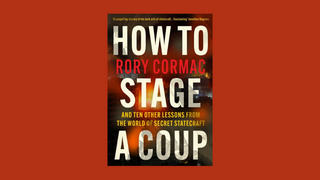In Katie Kitamura’s brilliant novel Intimacies (2022), the story of a former African dictator being tried in the International Criminal Court, there is a summary of the case against the accused:
The national electoral commission and outside observers called the election in favor of the accused’s opposition. The accused refused to cede power […] He then indulged in some creative accounting, nullifying the votes in districts where his opponent polled strongly, ordered the army to close the borders, and barred all foreign media. The accused then […] formed an army of mercenaries and began a process of ethnic cleansing, leading to death squads and mass graves.
When I read this, I thought it was a chilling but generic story of autocracy in action. It reminded me of the arresting claim in Jess Hill’s essential book on the subject of domestic violence See What You Made Me Do – that abusers follow such a familiar pattern it is as if they have a manual.
The same could be said of dictators when they defy election results, constitutional processes, and the rule of law. They follow a well-trodden path from mendacity to violence, so much so that the formula has been set out in Steven Levitsky and Daniel Ziblatt’s bestseller How Democracies Die (2019).
From a delightful podcast interview with Kitamura, however, I learnt that the case detailed in her novel was not generic, but based on the actions of Laurent Gbagbo, the former president of Ivory Coast. Kitamura had travelled to The Hague to sit in the viewing gallery and watch Gbagbo’s trial before the International Criminal Court.
Can a “coup” be staged by a leader clinging to power when election results have gone against them? The answer is yes. Donald Trump has provided the most obvious recent example of an attempt to overthrow due process, the Constitution, and other branches of government.
Rory Cormac’s How to Stage a Coup places Trump’s actions into a much longer history of nefarious behaviour by leaders and nations. The focus of the book is largely on what states covertly do to other states, rather than what dangerous leaders inflict upon their own people. But in the age of cyber warfare, Cormac wisely contends that populist politics at the national level creates internal divisions that are more easily exploited by foreign enemies.
Can a “coup” be staged by a leader clinging to power when election results have gone against them? The answer is yes. Donald Trump has provided the most obvious recent example of an attempt to overthrow due process, the Constitution, and other branches of government.
Donald Trump has been central to making US politics more openly xenophobic, anti-democratic and sadistic. It is not surprising that Russia and other enemies of the US have poured fuel on this dumpster fire, seeking to create even more instability by aiding Trump’s most extreme supporters and, as Cormac writes, also aiding his radical opponents.
Disinformation
The charm of Cormac’s book is its accessibility. He has achieved the rare academic feat of writing a bestseller. How to Stage a Coup is breezily written in a style that suits aeroplane reading. I recently spotted copies piled up in a tower in a bookstore at Sydney Airport.
This is not a criticism – Cormac has done the public a service by producing such a readable history of covert action, one that ends with a series of warnings about what democratic states like the UK, US and Australia need to do to make them less vulnerable to interference.
One of the joys of reading a popular history of espionage and foreign interference by a true expert like Cormac is the dazzling array of examples he presents. Many of these remarkable and disturbing anecdotes made me want to interrupt my fellow travellers’ action films on a recent flight to Dubai and say “listen to this story if you want to be truly entertained”. Cormac is not above making references to Hollywood and James Bond, reminding the reader that this material is often more incredible than the kinds of plots the passengers on my plane were engrossed in.
Although Cormac provides many illustrative historical examples of covert action, the strength of the empirical evidence is his focus on cyber warfare and disinformation – a term that he notes “comes from the Russian dezinformatsiya and only entered the English lexicon in the late 1970s”.
One recent example he highlights is a Chinese propaganda effort that focused on Italy at the beginning of the COVID-19 pandemic, which aimed to deflect claims that China hid information about the virus. Chinese propaganda presented China as offering generous medical support to sick Italians and suggested the virus might have originally come from the United States.
Russians and Iranians also suggested COVID began in the US. Proving the maxim often misattributed to Mark Twain – “a lie can travel halfway around the world while the truth is still putting on its shoes” – bogus stories on the origins of COVID were picked up by newspapers such as the Helsinki Times and the New Zealand Herald.
One recent example he highlights is a Chinese propaganda effort that focused on Italy at the beginning of the COVID-19 pandemic, which aimed to deflect claims that China hid information about the virus. Chinese propaganda presented China as offering generous medical support to sick Italians and suggested the virus might have originally come from the United States.
The disinformation strategy has parallels to Soviet propaganda in the 1980s, which spread the claim in the Indian media that US scientists had created the AIDS virus. The story was later pushed by Moscow and East Germany across Africa, South America and Europe. During the COVID pandemic, Cormac claims, “pro-Kremlin media sensationalized reports” linking blood-clots to the AstraZeneca vaccine. He argues that Russia and China both engaged in COVID disinformation schemes “to demonstrate the failure of democracies” to protect their own people.
American misdeeds
How to Stage a Coup is not just rightly critical of Russian and Chinese covert actions. It also ably details American misdeeds in Latin America, Asia and elsewhere. “Between 1951 and 1975,” writes Cormac, “the US conducted over nine hundred covert actions.”
He mentions several ridiculous plans the US had to overthrow Fidel Castro, such as a proposed operation to fake the second coming of Jesus Christ, which would be signified by submarines firing “star-shells into the night sky to signal Christ’s arrival and spark an insurrection”.
A lot of covert action has terrible consequences. It often removes imperfect leaders, only to replace them with murderous dictators. One story of Cormac’s I had not read about before was that the Australian government “dutifully established a spy station in Santiago” in 1970 to support American efforts to discredit and destabilise the democratically elected government of Salvador Allende. The Allende government was eventually overthrown in 1973 in a US backed military coup that installed Augusto Pinochet as dictator. Such out of area action is an example of Australia trying to curry favour with the US, with little thought for the consequences on the local population.
Cormac does not just offer examples of nefarious covert action, he also offers advice on how states might better counteract attempts to undermine them. A key recommendation is to address disinformation from the bottom up. Children should be educated about disinformation techniques at high school. Another recommendation is to have expert units to address cyber attacks and disinformation within governments.
One interesting example of fighting back that Cormac provides is the UK spy agency Government Communications Headquarters (GCHQ) being “instructed” by ministers during the COVID-19 pandemic to “take out anti-vaxxers online and on social media”. This led to these people being blocked from communicating with each other by encryption programs. The targeting of misguided UK residents was challenged as being beyond GCHQ’s remit.
There are many other bizarre and brutal examples in the book. In 2017, a tourist at Kuala Lumpur airport was tricked into putting a poisoned cloth to the mouth of Kim Jong Nam – Kim Jong Un’s half-brother – in a deadly fake “candid camera” situation. The story of a professor at the University of Nottingham, who was a critic of the Chinese government, having an email sent from their account informing their colleagues they were resigning to take up a position at another university is chilling. Fake emails like this obviously have the ability to cause a lot of reputational damage and personal distress.
I highly recommend Cormac’s How to Stage a Coup to anyone with a general interest in the history of covert action and disinformation. It provides an accessible guide to this complex and nightmare-inducing topic. Academic readers will probably wince at the regular references to how the real world of covert action does or does not resemble James Bond films, while enviously dreaming of their next book being piled high at any bookshop.






